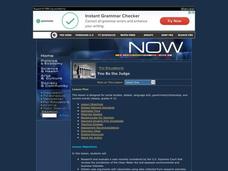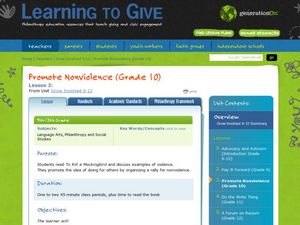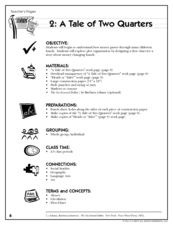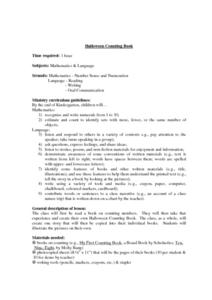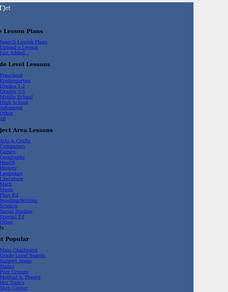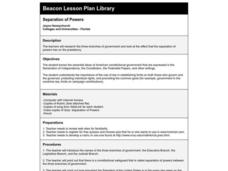Curated OER
Tolerance in Times of Trial
Learners view the treatment of people of Japanese and German descent during World War II. They explore the problems in assigning blame to populations during times of war. They identify modern examples of discrimination and stereotyping.
Curated OER
Political Cartoons
Young scholars explore political cartoons. In this government current events lesson, students analyze the visual language and symbolism present in five different political cartoons. Young scholars discuss the event or issue...
Curated OER
You Be the Judge
High schoolers research and evaluate a case considered by the U.S. Supreme Court regarding the jurisdiction of the Clean Water Act. They watch a Bill Moyers video, conduct a debate, and write about the decision they would make if they...
PACER Center
The Peer Advocacy Guide
Teasing, mocking, and disrespect can be the hallmarks in the life of those with disabilities. Disrupt the cycle of abuse with a toolkit designed to turn peers into advocates for all those who are bullied. Everything needed to create a...
Curated OER
Blog Your Truth
Students explore communication by participating in a digital journalism activity. In this aboriginal research lesson, students view a sample blog on the Internet and identify the techniques behind blogging and Internet journalism...
Lerner Publishing
Teaching Vowel Combinations
Need some fun activities to augment your lessons on vowel patterns and phonemic awareness? Peruse a series of worksheets designed to help little ones with their early reading skills.
Curated OER
Patriotic Symbols of the United States
Young historians take a close look at the most famous patriotic symbols of the United States and determine what they actually stand for. Symbols such as Uncle Sam, The Statue of Liberty, The Bald Eagle, and The Liberty Bell are studied....
Curated OER
Express Your Opinion
Learners explore local, state, and national levels of government and discuss which level of government they should contact to get information, express their opinions, or get help on specific issues.
Curated OER
Jim Crow Lesson Plan
Jackie Robinson's attempt to earn a spot on the 1946 Brooklyn Dodgers provides learners with an opportunity to examine the Jim Crow laws and revisit issues of segregation and integration. "The Unconquerable Doing the Impossible: Jackie...
Curated OER
Promote Nonviolence
Take a look at the topic of violence as seen in Harper Lee's To Kill a Mockingbird. Discuss together the values that Atticus holds and brainstorm ways to combat violence in a similar manner to what he portrays in the novel. Get your...
Curated OER
A Tale of Two Quarters
Have your class use the life of a quarter to understand and design plot and flow charts. They read the book, The Go-Around Dollar, think about how their teacher got her quarters that day, then create a flow chart. They have to show how...
Curated OER
Autism is a World
Explore Autism by watching the CNN presentation: Autism is a World. Upper graders view and discuss the documentary identify the symptoms and characteristics of autism, research treatment options, and create an...
Curated OER
Halloween Counting Book
First graders recognize and write numerals from 1 to 10. They estimate and count to identify sets with more, fewer, or the same number of objects, listen and respond to others in a variety of contexts, and take turns speaking in a...
Curated OER
My Name Is...
First graders write four simple sentences about themselves. In this simple sentences lesson plan, learners insert a picture of themselves into Microsoft Word. Everyone writes four simple sentences about themselves. These pictures and...
Seussville
What Can Your Class Do?
Inspire scholars to do their part for planet Earth with a read-aloud of Dr. Seuss's The Lorax, and variety of activities designed to boost the environmental activist in us all. Activities include writing poems about the Earth,...
Curated OER
Miss America
The first part of this article by PBS on the Miss America pageants can be used in a health class when it's time to talk about body image. There are links to related articles. There are some great questions for discussion. There are ideas...
Curated OER
Results In On Mock Election
Students examine the two presidential candidates in 2000, and identify their own stance on campaign issues. They create fictional candidates that represent their beliefs, and write campaign speeches from their point of view.
Curated OER
Fighting Political Apathy Among Youth
Students research and describe youth participation in political elections. They survey random adults about their voting behavior and chart the results in a graph. They compile their results to predict future voter participation.
Curated OER
The Euro Quiz
Students read and discuss a news story "Government to say if UK will Join Euro." They take a Euro Quiz, or produce a TV quiz show using the questions. Alternatively students may write a report on the Euro or perform research to learn...
Curated OER
The Way Editorial Cartoons Work
Twelfth graders interpret visual language found in political cartoons.
Curated OER
Fabulous Forensic Fingerprints
Learners observe their fingerprints and notice how all human bodies are different. In this fingerprints lesson plan, students see the loops, whorls, and arches that make everyone's fingerprints different, and make a class graph for which...
Curated OER
Metis - Grade 10
Tenth graders investigate the organization and purpose of the Metis. In this Canadian history lesson, 10th graders watch "Metis Settlements," and then participate in talking circles sharing their impressions of the video.
Curated OER
Separation of Powers
Eighth graders research the three branches of government and examine the effect that the separation of powers has on the presidency. They explain the importance of the rule of law in establishing limits on both those who govern and the...
Curated OER
Creating a Consumer-Awareness Information Campaign
Young scholars work across grade levels to research and design a community awareness campaign on the benefits of purchasing fair trade chocolate. They develop print advertisements, conduct research, write letters, make posters and...


